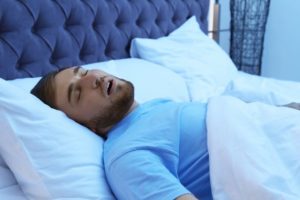Why Sleep Apnea Increases Your Risk of Gum Disease
October 26, 2022

It’s well known that people who suffer from sleep apnea not only have to deal with feeling tired all the time, but the disorder is also closely associated with an increased risk of serious problems like cardiovascular issues, diabetes complications, and dementia. Now, according to a study recently published in Sleep, the official scientific journal of the Sleep Research Society, gum disease can be added to that list. How are these two conditions connected, and what should someone with sleep apnea do in order to protect their oral health?
The Connection Between Sleep Apnea & Gum Disease
Gum disease is a bacterial infection that affects the roots of the teeth as well as the supportive soft tissue and bone that keeps them stable. Our mouths are filled with bacteria, both good and bad, and routine oral hygiene along with dental visits make sure that the balance stays in our favor.
However, if a person has sleep apnea, then they most likely breathe through their mouth while they sleep. This causes it to dry out and reduces the production of saliva, which naturally protects us from an excess of harmful bacteria.
With this in mind, the connection is easy to see. A person who consistently breathes through their mouth for five to eight hours each night is giving the bacteria responsible for gum disease a chance to grow and multiply. This can be further compounded because sleep deprivation can make a person less likely to brush and floss and also lead them to eat more sugary, processed foods, two other factors that stimulate gum disease.
The Symptoms of Gum Disease
It surprises most people to learn that gum disease is actually the most common dental problem in the world, and about 50% of the U.S. adult population has at least a mild form of it. The symptoms are almost unnoticeable at first, but they can become very serious without treatment:
- Red, swollen, and tender gums
- Bad breath that doesn’t get better after brushing or mouthwash
- Gum recession
- Pockets of bacteria forming between the gums and teeth
- Loose teeth
- Tooth loss
What Can You Do?
Thankfully, there are proven solutions for both sleep apnea and gum disease that are easily accessible. Oral appliance therapy encourages nasal breathing during sleep and also stops the snoring/interruptions in respiration throughout the night. And for gum disease, brushing twice a day, flossing once, and getting professional checkups twice a year can stop the infection before it starts.
This study’s findings illustrate how everything is connected when it comes to your health, and with the right sleep dentist on your side, you can effectively address both issues so you can rest well and smile with confidence for years to come.
About the Author
Dr. Eric Coontz is honored to serve the Albuquerque area. He received his dental doctorate from the Loyola University School of Dentistry in Chicago and maintains active memberships in several professional organizations, including the American Academy of Sleep Medicine, and he has Diplomate status in the American Sleep and Breathing Academy. His practice is proud to offer a wide range of available treatment options such as oral appliance therapy for sleep apnea. If you have any questions about sleep apnea or would like to schedule a visit, contact Dr. Coontz online or over the phone at (505) 433-2107.
No Comments
No comments yet.
RSS feed for comments on this post.
Sorry, the comment form is closed at this time.
